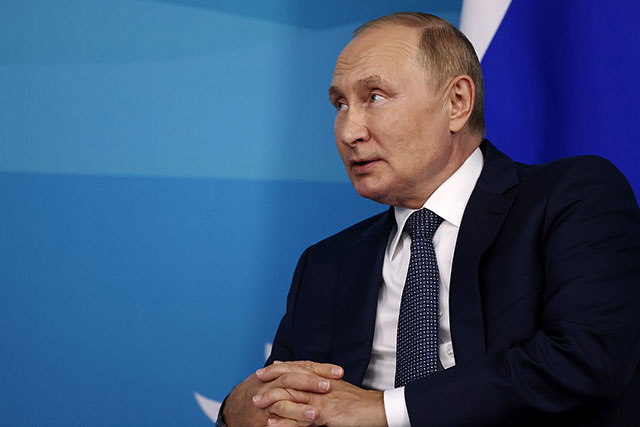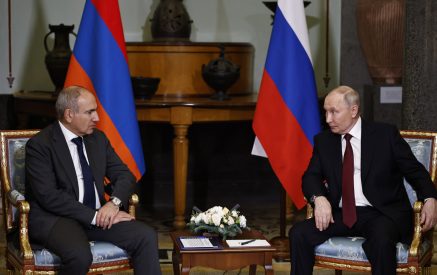(Reuters) – President Vladimir Putin said on Wednesday he wanted to discuss reopening a U.N.-brokered deal that allows Ukraine to export its grain via the Black Sea and threatened to halt all energy supplies to Europe if Brussels caps the price of Russian gas.
In a combative speech to an economic forum in Russia’s Far East region, Putin made little reference to his invasion of Ukraine, but said in answer to a question that Russia would not lose the war and had strengthened its sovereignty and influence.
On the ground, Ukrainian officials remained guarded about how a counter offensive they began late last month was faring but a Russian-installed official in eastern Ukraine said Ukrainian forces had attacked a town there.
The grain pact, facilitated by the United Nations and Turkey, created a protected export corridor via the Black Sea for Ukrainian foodstuffs after Kyiv lost access to its main export route when Russia attacked Ukraine via land, air and sea.
Read also
Designed to help ease global food prices by increasing supplies of grain and oilseeds, the agreement has been the only diplomatic breakthrough between Moscow and Kyiv in more than six months of war.
But Putin said the deal was delivering grain, fertiliser and other foodstuffs to the European Union and Turkey rather than to poor countries whose interests he said were the pretext for the deal and added that he wanted to discussing changing its terms.
“It may be worth considering how to limit the export of grain and other food along this route,” he said, while also saying that Russia would continue to abide by its terms in the hope that it would fulfil its original goals.
“I will definitely consult the President of Turkey, Mr. (Tayyip) Erdogan, on this topic because it was he and I who worked out a mechanism for the export of Ukrainian grain first of all, I repeat, in order to help the poorest countries.”
His comments raised the possibility the pact could unravel if it cannot be successfully renegotiated or might not be renewed by Moscow when it expires in late November.
Ukraine, whose ports had been blockaded by Russia after it invaded in February, said the terms of the agreement, which was signed on July 22 for a period of four months, were being strictly observed and there were no grounds to renegotiate it.
“I believe that such unexpected and groundless statements rather indicate an attempt to find new aggressive talking points to influence global public opinion and, above all, put pressure on the United Nations,” said Mykhailo Podolyak, a presidential adviser.
The deal threw a lifeline to Kyiv, giving a much-needed source of revenue to an economy devastated by war. It does not say anything about which countries Ukrainian grain should go to and the United Nations has stressed it is a commercial – not humanitarian – operation that will be driven by the market.
According to data from the Istanbul-based coordination group which monitors the deal’s implementation, 30% of the total cargo, which includes that earmarked for or routed via Turkey, had gone to low and lower-middle income countries.
GRAIN AND GAS
Ukraine hopes to export 60 million tonnes of grain in eight to nine months, presidential economic adviser Oleh Ustenko said in July, cautioning that those exports could take up to 24 months if ports do not function properly.
Putin complained that another part of the deal meant to ease restrictions for Russian food exporters and shippers was not being implemented either.
Russian Foreign Minister Sergei Lavrov cast doubt on the deal too a day earlier, accusing Western states at the United Nations of failing to honour reciprocal pledges to help facilitate Moscow’s shipments.
Russia’s grain exports in August are expected to come in 28% lower than the same period last year, according to a forecast from Russia’s Sovecon consultancy.
The other main global repercussion of Russia’s invasion of Ukraine has been a surge in energy prices as the West responded with sanctions and Moscow restricted exports of gas to Europe, blaming Western restrictions and technical problems.
As the European Union prepared to propose a price cap on Russian gas to try to contain an energy crisis that threatens widespread hardship this winter, Putin threatened to halt all supplies if it took such a step.
“Will there be any political decisions that contradict the contracts? Yes, we just won’t fulfil them. We will not supply anything at all if it contradicts our interests,” Putin said.
“We will not supply gas, oil, coal, heating oil – we will not supply anything,” Putin said.
Europe usually imports about 40% of its gas and 30% of its oil from Russia.
UKRAINIAN BATTLEFIELD SUCCESS?
Asked about what Russia calls its “special military operation” in Ukraine by a moderator at the economic forum in Vladivostok, Putin said:
“We have not lost anything and will not lose anything … In terms of what we have gained, I can say that the main gain has been the strengthening of our sovereignty.”
The governor of Ukraine’s eastern Luhansk region, which Russia has said it has taken over on behalf of separatist proxies, told Ukrainian television on Tuesday that Ukraine was fighting back.
A “counter-attack is underway and … our forces are enjoying some success. Let’s leave it at that,” Serhiy Gaidai said on Tuesday, without giving locations.
An official with the pro-Moscow self-proclaimed Donetsk People’s Republic on Tuesday said there was fighting at Balakliia, an eastern town of 27,000 people between Kharkiv and Russian-held Izyum, site of a major railway hub used by Moscow to supply its forces.
“Today, the Ukrainian armed forces, after prolonged artillery preparation … began an attack on Balakliia … ” Daniil Bezsonov said on Telegram, adding that if the town were lost, Russian forces in Izyum would become vulnerable on their northwest flank.
Russia says it has repelled an assault in the south and has not reported any territorial losses.
Russia’s Defence Ministry said its forces had taken Kodema in eastern Ukraine’s Donetsk region from Ukrainian forces. The village of some 600 people is claimed by the Russian-backed Donetsk People’s Republic as part of its territory.





























































